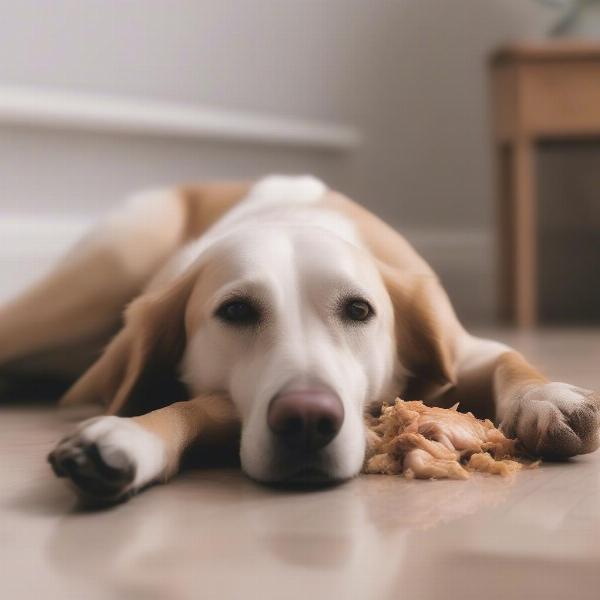My dog ate a whole rotisserie chicken! Panic is probably setting in, and you’re understandably worried. Finding your dog with an empty rotisserie chicken carcass can be a scary experience. This article will guide you through what to do next, outlining potential risks, signs to watch for, and when to seek veterinary attention. We’ll cover everything from immediate actions to preventative measures, ensuring you’re prepared for any future feathered fiascos.
What are the Risks if My Dog Eats a Rotisserie Chicken?
Rotisserie chicken, while delicious for us, presents several potential dangers to dogs. The high fat content can lead to pancreatitis, a painful inflammation of the pancreas. Cooked chicken bones, especially those small and brittle ones found in rotisserie chickens, can splinter and cause choking, or perforate the stomach or intestines. The seasonings often used on rotisserie chickens, such as garlic and onion powder, are toxic to dogs and can cause anemia. Finally, the high salt content can lead to dehydration and electrolyte imbalances.
What Should I Do if My Dog Ate an Entire Rotisserie Chicken?
First, remain calm. Assess the situation. How much of the chicken did your dog actually consume? Did he eat any bones? If your dog seems distressed or is showing any immediate signs of choking (gagging, pawing at the mouth, difficulty breathing), contact your veterinarian or an emergency animal hospital immediately. If your dog appears fine, monitor him closely for the next 24-48 hours.
Signs to Watch For After My Dog Ate a Rotisserie Chicken
Even if your dog seems okay initially, several symptoms could indicate a problem. Look out for vomiting, diarrhea (which may be bloody), lethargy, loss of appetite, abdominal pain or distension, difficulty defecating, or changes in behavior. If any of these signs appear, contact your veterinarian immediately. Early intervention is key to preventing serious complications.
 Dog Showing Discomfort After Eating Chicken
Dog Showing Discomfort After Eating Chicken
How Can I Prevent My Dog from Eating Rotisserie Chicken Again?
Prevention is always better than cure. Ensure rotisserie chickens are stored out of reach, preferably in the refrigerator or a securely closed cabinet. Never leave a rotisserie chicken unattended on a counter or table. Train your dog basic obedience commands like “leave it” and “drop it” to help prevent them from snatching food they shouldn’t have. A securely fenced yard can also help keep your dog away from discarded chicken bones if you’re eating outdoors.
Will My Dog Be Okay After Eating a Whole Rotisserie Chicken?
In many cases, dogs will recover from eating a rotisserie chicken without any lasting effects, particularly if they didn’t consume the bones. However, the potential risks are significant, so vigilant monitoring and prompt veterinary care are crucial. Don’t wait for symptoms to appear if you know your dog has ingested cooked bones, seasonings, or a large amount of fatty food.
Conclusion
Discovering your dog has devoured a whole rotisserie chicken can be alarming. While many dogs will be fine, it’s essential to be aware of the potential dangers and monitor your pet closely for any signs of illness. Swift action and preventative measures can protect your furry friend from harm. Remember, if you are ever concerned about your dog’s health, contacting your veterinarian is always the best course of action.
FAQ
- What is the most dangerous part of a rotisserie chicken for dogs? Cooked chicken bones, especially the small, brittle ones, can splinter and cause internal damage. Toxic seasonings like onion and garlic are also a concern.
- How long after eating a rotisserie chicken should I monitor my dog? Monitor your dog closely for 24-48 hours after ingestion, watching for any unusual symptoms.
- Should I induce vomiting if my dog ate a rotisserie chicken? Do not induce vomiting unless instructed by your veterinarian. It can sometimes do more harm than good.
- Can I give my dog anything to help them digest the chicken? No, do not administer any medications or home remedies without consulting your veterinarian.
- What should I tell my vet if my dog ate a rotisserie chicken? Inform your vet about the amount of chicken consumed, whether any bones were eaten, and any symptoms your dog is exhibiting.
- How can I prevent this from happening again? Store rotisserie chickens securely out of reach, train your dog basic obedience commands, and supervise them closely during mealtimes.
- Is it ever safe to give my dog rotisserie chicken? While small amounts of boneless, skinless, unseasoned rotisserie chicken meat are generally okay as an occasional treat, it’s best to avoid it altogether due to the potential risks.
ILM Dog is your one-stop resource for expert advice on dog care and wellbeing. We offer comprehensive information on dog breeds, health, training, nutrition, grooming, and much more. From puppy care to senior dog needs, ILM Dog helps you navigate every stage of your dog’s life. Need more personalized advice? Contact our expert team at [email protected] or call us at +44 20-3965-8624. Visit ILM Dog for all your dog-related needs.